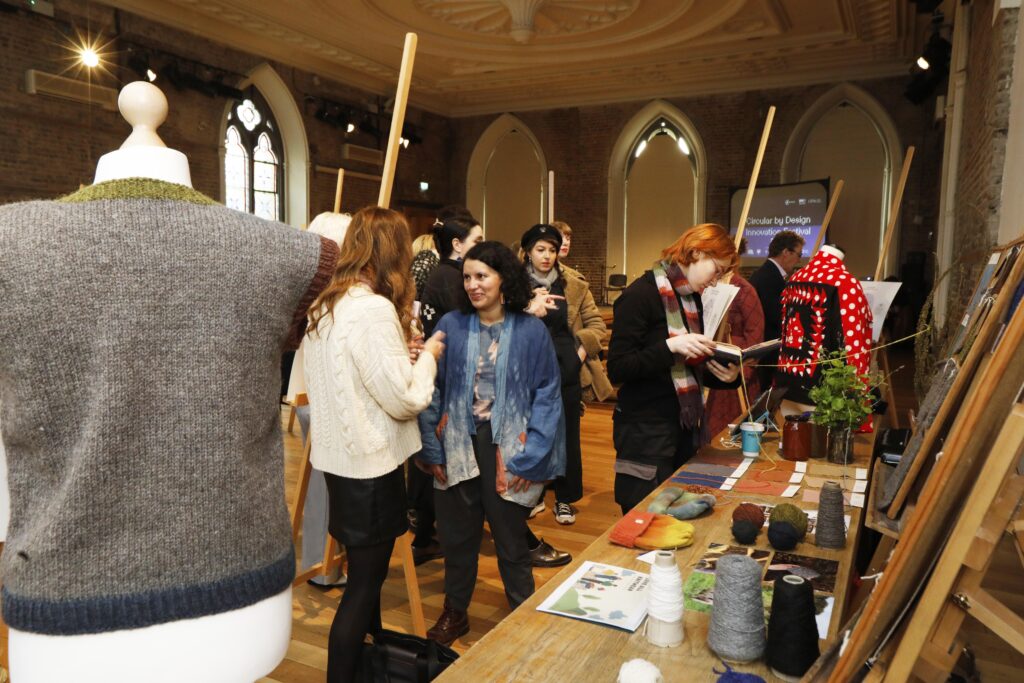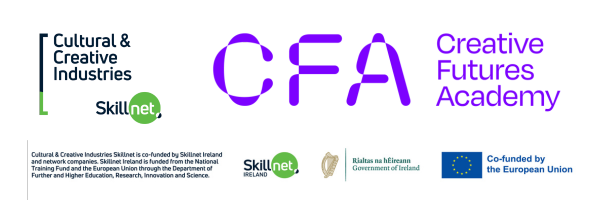
Professional Diploma in Circular by Design

15 Sep 2025
Apply By
1 Sep 2025
Apply To
NCAD
ECTS Points
20
Level
9
Fees
€1,250* or €2,200


1 Sep 2025
NCAD
20
9
€1,250* or €2,200

This course creates a stage for the exploration of the complex issues around fashion, textile design and product design, to interrogate and provoke sustainable systemic change.
Creative Futures Academy is delighted to collaborate with Cultural & Creative Industries Skillnet to offer a special partnership rate of €1250 for qualifying candidates, which includes those resident in the Republic of Ireland and not already in receipt of a bursary, grant aid or a scholarship for this course and not participating in a CE scheme or in receipt of Unemployment Benefit.
This Cultural & Creative Industries Skillnet programme is co-funded by the Government of Ireland & the European Union. www.eufunds.ie

The circular economy requires the redesign of everything – from materials, to products, to services, to systems. This course provides the methodology, tools, practice and theory for learners to design a different future for the sector.
Integrating a network of international organisations, charities and companies who are making change happen, this pathway supports embodied learning to encourage acting, as well as making and thinking. Learners connect the materials, the production, the practices and systems to opportunities for rethinking and reforming.
The role of the designer in the circular economy is of paramount importance, as is the integration of circular economy principles into design practice and thinking.
This course supports learners to fabricate critical and vital dialogues It creates the stage for new attitudes, knowledge and skill sets which will shape the future.
The programme encourages participants to integrate research, creative practice and contemporary
methods, theory and contexts.
It promotes the application of knowledge to design practice, policymaking, and addressing ecological and social challenges across interconnected systems.
Through a combination of taught seminars, workshops, and independent study, participants will be invited to question and critique consumption and purpose and explore alternative methods for designing, producing, selling, using, and disposing at the end of the value chain.
Using their own design practice, research, and experience as a guide, participants will develop a critical perspective on the local and global challenges that industry faces, and begin to shape and articulate their unique roles within it as change makers.
Through live, industry-informed projects, participants will have the opportunity to collaborate with peers and external partners, such as designers, retailers, manufacturers, circular innovators, social enterprises, and local councils. These collaborations aim to innovate and test new circular systems, tools, products, and services.
Successive modules allow participants to develop their specialist practice, their professional,
technical and organisational skills and their knowledge and application of critical contexts to:
● EXPAND creative thinking to support a change of perspective across and beyond the sector.
● CONNECT with social and cultural change to create impact.
● BUILD sustainable communities of interest that grow without discipline.
● INCUBATE agile creative practitioners, businesses and organisations that can change
the social, cultural and economic worlds.
● POSITION change from a communication and content led place.
● ALIGN learning and teaching to a change-led view of the world, society, economies
and sectors in and beyond Ireland.
● ENGAGE with emerging technology, tools and practices to create continual change in
the creative sector.
The Professional Diploma would create a perfect foundation for anyone who want to build a deep and nuanced understanding of sustainability and circularity and practically apply that knowledge to their own practice.
The programme seek to prepare students, from the broadest range of creative backgrounds, with the practical and theoretical means to develop contemporary design practice and theory within a specialist award, while benefitting from a broader interdisciplinary creative discourse and
community of practice.
This Professional Diploma is running from September 2025 until January 2026.
There will be an online Introduction session for the Circular by Design students on the evening of the 9th of September.
Induction for all Postgraduate courses will take place on Friday, 12th September (12pm, in person, main campus)
The classes will commence the following week, Tuesday, 16th September.
Learners are required to commit +20hrs per week to successfully complete the programme. Learning hours per week vary, but typically, learners can expect up to 1 day per week (7-8 hrs on Tuesdays) of contact time, and the remaining time (10-12 hours) will consist of individual and self-led work and study.
The programme will be delivered through a blended model, with both online and offline learning, to accommodate a diverse group of learners. Types of learning and teaching methods include lectures, seminars, masterclasses, workshops, small group presentations and tutorials. In general, learners will be expected to be on the NCAD campus for in-person delivery, once every three weeks.
The professional Diploma culminates in Capstone Project in which students undertake a project that demonstrates learners’ knowledge of creative circular practices and theories.
The circular economy is an economic and industrial model based on the principles of reducing consumption of natural resources, designing out waste and pollution, keeping products and materials in use for as long as possible, and recycling the materials at the end of life.
However, the transition from a linear to a circular requires new and additional attitudes, knowledge and skill-sets. An estimated 80% of a product’s environmental impact is determined at the design stage, before production even begins. Therefore, designers have a pivotal role to play in reshaping all aspects of the industry – from materials, to products, to services, to systems.
For example, the fashion and textiles industry is the joint third highest emitter of greenhouses globally, responsible for 10% of carbon emissions, more than all international flights and shipping combined. Operating in a largely linear take-make-use-waste system, textiles is one of the most pollutive and wasteful industries on earth.
Collaboration is a key element of the circular economy, since it is essential to work together throughout the supply chain, internally within organisations and with the public sector to increase transparency and create joint value.
Therefore, the Professional Diploma has a considerable emphasis on collaborative engagement with peers, as well as with private and public stakeholders from across the textiles value chain.
Throughout the programme, learners will receive input, in the form of lecturers, panel discussions and coaching from a number of international experts, companies and innovators.
The Professional Diploma aims to prepare graduates for careers in the textiles and fashion industry, independent circular design consultancy, start-up ventures, creative practice and academic research.
You will have the foundational knowledge, skills, and attitude to develop and implement novel circular design and business model concepts.
With the skills to develop circular design solutions related to material and product innovation and systems and service innovation, graduates have a wide range of local and global opportunities available to them. Potential career pathways for graduates include:
Graduates are also supported to progress to MA and then PhD level.
It is required that all applicants have a Completed Professional Certificate (Creative Principles) module. Professional Certificate (Creative Principles) is the foundation module of the Professional Diploma programme.
Educational Standard: All applicants are expected to present an approved Bachelor degree at minimum level of 2nd class honours (2.2)
Recognition of Prior Learning (RPL) – Applicants who do not meet the minimum academic entry requirements for admission may be considered on the basis of a recognition of previous learning whether based on prior relevant experience or other relevant credited or non credited or learning (RPL). In such cases each applicant will be considered on a case-by-case basis based on a review of the applicant’s CV and other supporting documentation.
Please contact ncad@creativefutures.ie for further information.
Qualifying Examination – In certain cases the academic team may choose to set a qualifying assignment in order to assess an applicant’s suitability for admission.
You may apply for the programme if you are currently completing your Undergraduate Degree. NCAD will review the rest of your application If necessary, we can make you a Conditional Offer. When your degree is completed and you send us final transcripts we will upgrade this to a Full Offer.
Applicants who have not been educated through English must show proof of achieving IELTS 6.5 (with a minimum of 6 in the writing section on the Academic Version) or an equivalent score in another accepted test.
There is a fee of €2200 for this programme.
50% payment is required upfront at registration.
Places are limited. If the course fills sooner, applications will close/go to waitlist.
Cultural & Creative Industries Skillnet Partnership Rate
Creative Futures Academy is delighted to collaborate with Cultural & Creative Industries Skillnet to offer a special partnership rate of €1,250 for qualifying candidates, which includes those resident in the Republic of Ireland and not already in receipt of a bursary, grant aid or a scholarship for this course and not participating in a CE scheme or in receipt of Unemployment Benefit. Find out more HERE
This Cultural & Creative Industries Skillnet programme is co-funded by the Government of Ireland & the European Union. www.eufunds.ie
Fees for those who do not meet the Skillnet criteria are €2,200.
Programme Contact
CFA coordinator Joanna Crawley crawleyj@staff.ncad.ie
Admissions Contact
postgraduate@ncad.ie
01 636 4200
Creative Futures Academy are delighted to collaborate with Cultural & Creative Industries Skillnet to offer a special partnership rate of €1,250 for this course. This course is co funded by the Government of Ireland and the European Union and you may be eligible for a fee reduction. Terms and conditions apply*. www.eufunds.ie

From clicking APPLY to accessing course materials
Thank you for your interest in the postgraduate courses at the National College of Art and Design.
This brief guide will help you understand what to expect from the enrollment process and how to best prepare for all necessary stages.
In the process of enrolling into a postgraduate course at NCAD you will:
We advise you to start this process no later than a week before the application deadline to gather necessary documentation and allow for any troubleshooting.